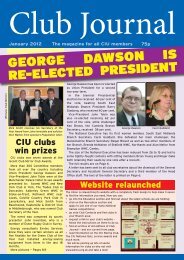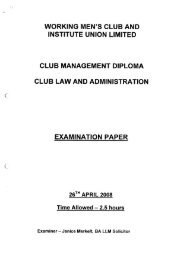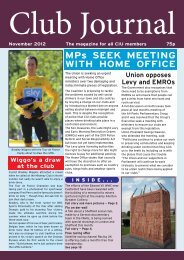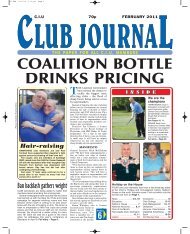Club
THE GOVERNMENT ARE STARTING TO LISTEN - CIU
THE GOVERNMENT ARE STARTING TO LISTEN - CIU
- No tags were found...
Create successful ePaper yourself
Turn your PDF publications into a flip-book with our unique Google optimized e-Paper software.
club IN ASSOCIATION WITH<br />
MANAGEMENT<br />
Managing sickness<br />
Failing to follow a fair and proper procedure when dismissing staff<br />
for absence can lead to costly disability discrimination and unfair<br />
dismissal claims, for which the average tribunal awards last year were<br />
£27,235 and £32,115 respectively. Such claims are increasingly likely<br />
as sacked employees struggle to secure alternative employment in<br />
the current job market.<br />
Dismissal is a last resort when dealing with genuine illness. If you<br />
comply with all four of the following stages you are unlikely to fall<br />
foul of the law:<br />
Stage one: Meeting with the employee<br />
The Secretary or another nominated official should conduct regular<br />
return-to-work meetings. They should meet any staff with high levels<br />
of absence to discuss the cause of the absences, any medical advice<br />
the employee has received, the likelihood of future absences, and<br />
possible job changes that would reduce the absences. <strong>Club</strong>s should<br />
discuss possible return-to-work dates for long-term absences, and<br />
plans to assist employees when they do return.<br />
Stage two: Medical input<br />
There may be an underlying cause for regular absences. <strong>Club</strong>s need<br />
medical input to understand what an employee is capable of doing,<br />
to find out if there are any adjustments that could be made to the<br />
employee’s role to reduce absence levels, and to get a view on<br />
whether the employee is disabled under the Disability Discrimination<br />
Act 1995 (DDA). Any medical input should be discussed with the<br />
employee as part of the consultation process.<br />
Stage three: Reasonable adjustments<br />
<strong>Club</strong>s have a legal duty to consider any “reasonable adjustments” to<br />
enable employees classed as disabled under the DDA to continue to<br />
perform their roles. Dismissing an employee not classed as disabled<br />
is also more likely to be fair if the club has considered possible<br />
adjustments and alternatives. (Whether or not an adjustment<br />
is reasonable will depend on: the practicability, cost and likely<br />
effectiveness of it; the club’s financial resources, and its nature and<br />
size; and the extent to which the employee, and possibly other staff<br />
members, are willing to co-operate with changes.)<br />
Stage four: Dismissal decision<br />
When considering dismissal Committees should have a full, upto-date<br />
picture of the employee’s medical condition and have<br />
considered alternatives to dismissal. They should also consider<br />
length CFS1571_CLUBS_CASH_CIU_64x90_ad_AWK_hr.pdf<br />
of service, performance, whether there is likely to be a<br />
change in attendance, whether suitable alternative work is available,<br />
and the effect of the employee’s absences on the club.<br />
We’re right on cue when<br />
it comes to cash<br />
Our Business Current Account – Cash Tariff<br />
offers competitive rates plus the convenience<br />
of paying in cash at the Post Office ® .<br />
To find out more<br />
0800 0282 282<br />
co-operativebank.co.uk/business<br />
Lines open<br />
8.30am to 5pm<br />
Mon to Fri<br />
ref: 39502<br />
The Co-operative Bank is authorised and regulated by the Financial Services Authority (No.121885),<br />
subscribes to the Lending Code and the Financial Ombudsman Service and is licensed by the Office of Fair<br />
Trading (No. 006110). The Co-operative Bank p.l.c., P.O. Box 101, 1 Balloon Street, Manchester M60 4EP. Registered in<br />
England and Wales No.990937. Calls may be monitored or recorded for security and training purposes. For BT customers, calls<br />
to 0800 numbers are free. Call charges from other providers may vary and you may wish to check this with your service provider.<br />
FSA threatens<br />
to prosecute<br />
All clubs are strongly advised to file their By Andrew Annual Dane Return and<br />
The Business Medic<br />
Accounts in a timely manner with the mutuals registration team at<br />
the FSA.<br />
The FSA as registrar of mutual societies has the power to<br />
prosecute, or cancel the registration of clubs who fail to submit<br />
their annual returns and accounts in a timely manner. If the<br />
FSA prosecutes your club, the case will be heard in court and<br />
will typically result in the club receiving a sizeable fine. This will<br />
generate unfavourable publicity for the club and its committee<br />
members; further the FSA publicises the successful prosecutions<br />
on their public facing web pages. http://www.fsa.gov.uk/pages/<br />
doing/small_firms/msr/prosecution.shtml<br />
The FSA are cancelling the registration of hundreds of mutual<br />
societies who are in persistent breach of the requirement to file<br />
their Annual Return and Accounts in a timely manner. Again, these<br />
are publicised on the FSA’s public facing web pages.<br />
http://www.fsa.gov.uk/pages/doing/small_firms/msr/cancellations.<br />
shtml<br />
There are several implications for deregistered clubs. The club<br />
will lose its limited liability status, potentially exposing its officers<br />
and members to personal financial risk; so creditors can pursue<br />
(individual) members for the debts of the deregistered club.<br />
Additionally if the club is an industrial & provident society it will<br />
also lose its corporate status. Without this it will not be able to hold<br />
property in its own name and would need to appoint trustees. You<br />
may require legal advice to both establish a new club and gain title<br />
to property. Such a process could prove to be hugely expensive.<br />
To ensure your club is not prosecuted or deregistered the secretary<br />
or treasurer must ensure that each year:<br />
1. The club’s annual accounts are produced in a timely manner and<br />
audited if necessary &<br />
2. The annual return and accounts are filed with the FSA within<br />
seven months of the club’s financial year end (or sooner if specified<br />
by the clubs rules).<br />
While the measures adopted by the FSA may appear severe, the<br />
CIU is in full agreement with the FSA on this matter. Namely, it<br />
is wholly inappropriate for a club to fail to properly account each<br />
year to its membership as to how all monies obtained through<br />
subscriptions have been used and provide that information to the<br />
FSA. Further where a club has not filed its accounting records with<br />
the FSA, it may prove difficult to change bank mandates or obtain<br />
loans from financial institutions.<br />
You can download a copy of the annual return form and the<br />
information note on completing it for your club from the following<br />
web page:<br />
http://www.fsa.gov.uk/doing/small_firms/msr/returns<br />
Please use the following link (to the mutual society public register)<br />
to check that your club’s details are correctly recorded with<br />
the FSA. These details include but are not limited to the club’s<br />
registered office address.<br />
https://mutuals.fsa.gov.uk/Search.aspx<br />
If you have questions on any of the above, you can email the<br />
mutuals registration team at:<br />
mutual.societies@fsa.gov.uk<br />
6<br />
<strong>Club</strong> Journal January 2013<br />
CJ January 2013.indd 6 14/12/2012 10:20











